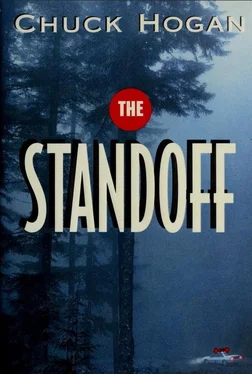“You want me to ring him?”
The phone would ring abruptly twice like a bicycle bell, as opposed to a long ring or beeping noise, as different as possible from the sound any sort of bomb might make. The throw phone was just that, in most situations lobbed in through a door or window, and hostage-takers were notoriously paranoid and hypervigilant.
“No,” Banish said, easing himself into the other chair, feeling his exhaustion. “We’ll wait, and listen. Let him call us.”
Banish was sitting back in the swivel-tilt chair in the quiet low light of the van monitors, tired but not sleeping. He could hear the deep, regular breathing of the sound man, who had put his head down to rest for a moment on the console board more than two hours before. Banish realized he still did not know the man’s name. But he let him sleep, and wished he could do the same. Banish sat in the humming darkness with his arms crossed over the borrowed parka he wore, the inside of the van not noticeably cold until just then. The van roof conducted the overnight chill. He was watching his breath mist and dissipate.
He had sat up the entire night. From time to time the noise-activated tape recorder reels clicked on and began their slow revolutions, but nothing audibly significant came out of the cabin: stray noises, rustling around, an occasional distant unintelligible voice. Banish was watching the monitors. Without daylight, the black-and-white images ran hazy, like photographic negatives. Now as day was starting to break, the cabin views, the empty road, the staging area, the bridge, all began filling in clearly, as though being tuned.
“Watson.”
The sound man bucked his head and jerked awake, clattering his headphones atop the console. He sat up straight and looked around. “Sorry,” he said, reaching for his headset.
Banish shook his head to show him it was all right. He picked up his own headset and put it on, adjusting the cushion comfortably over one ear, the opposing brace above the other. The tape reels had resumed their revolutions.
“Watson.”
Patience. Control. He had spent all night waiting for this. Banish cleared his throat and fixed the connected microphone under his chin. He pushed the appropriate button, cutting off the van speakers and patching himself through.
“Mr. Ables,” he said. “How is your wife doing?”
Ables’s voice sounded strained. “She’s all right now.”
“We have an ambulance available, and two paramedics, just twenty-five yards away from your cabin door. If you look out your window, you can see them.”
“She is all right,” Ables said.
“Can you tell me where she was injured?”
“Her arm.”
Banish nodded, encouraged. If it was just her arm, then Ables with his military background could treat her for days if necessary. Banish said, “I would ask you to put her on...”
“But she lost her voice to cancer,” Ables said. “I bet you think you know a lot about us. I bet you got files and witnesses and depositions and everything. You’re probably some kind of shrink yourself.”
“I am not,” Banish said. “Mr. Ables, have you given any more thought to coming out?”
“Never.”
“What about your children, Mr. Ables? They are much too young to be going through this. Think of the effect this ordeal must be having on them.”
“I warned you, Watson. Don’t talk to me about my family. Don’t talk like you know me. You want to do my kids some good, you all go away then. Because we can outlast you here. My kids are survivors, that’s how they were raised. My kids are tough. Tougher than any man you got hiding behind a tree.”
“You may be right about that, Mr. Ables,” Banish said. “And believe me, no one is telling you how you should or should not raise your own children. But they are just children, Mr. Ables. Minors, all of them. This is a situation for adults.”
“You don’t get it, Watson. Do you. My kids want to be here. We’re a family. There’s no place else they’d rather be.”
Banish said, “I do understand that, Mr. Ables. I understand how close-knit you and your family are. I’m sure a lot of people envy that closeness. That is what I am talking about. Mr. Ables — you must know that you can never get away from here. You are completely surrounded. This entire mountain is cut off from the rest of the world. We can sit out here and wait for you forever, and you can sit in there and wait for us, but the bottom line is, you are caught. You cannot escape. For all intents and purposes, you are already in police custody. Now, you have been charged with a serious crime. And your wife, by virtue of remaining at your side through all of this, has become an accomplice.”
“You’re trying to threaten me, Watson.”
“No, Mr. Ables.” Banish was shaking his head. “I am not. I am being straight with you here. I am giving you as much information as I can so that you are able to make an informed decision. If these men have to go in and extricate you from your home by force, then both you and your wife will be arrested and charges will be brought. If you are subsequently found guilty in a court of law, then your children, as minors, will likely become wards of the social services department of the state.”
Ables said, “They would go to their grandparents.”
“The grandparents could request a custody hearing,” Banish said, nodding. “As could the Newlands or the Mellises. But there will be experts involved, child psychologists. They will likely testify that a lot of damage has been done to the children already, from the psychological effects of this situation alone. I imagine they will recommend close treatment.”
“Sons of—” Ables swallowed his anger.
“There is of course a chance that one of your in-laws could win custody, Mr. Ables. But the determination would likely be that the best way to monitor them would be to keep them away from relatives for the time being.”
Ables’s voice sputtered. “Sons of bitches,” he tripped out. “That’s what this government is. Framing people, busting up families. You’ll never arrest me, Watson—”
“If these men are forced to go into your home, Mr. Ables, your children will likely be taken away from you. I am just making you aware of this. They will be parceled out to foster homes — most of which are run by good, family people — and then, depending on the length of term of your and your wife’s sentences, and the outcome of the grandparents’ hearing, the youngest of your children will likely then be put up for adoption.”
Ables let out an angry, choked noise. “So that’s it,” he said. “The federal government establishment really got its teeth in now. Get Ables at any cost. Frame him. Kill his daughter. Shoot his wife. Smash up his family. But let the niggers and the drug dealers in the streets run free. Let the faggots bend each other over in alleyways. You tell me there’s no conspiracy, Watson. You tell me that.”
“I don’t know what you are talking about, Mr. Ables.”
“Tell me I haven’t been selected for extermination by the executive council in Washington, D.C. Tell me there is no list with my name at the top of it.” His voice was rising. “Why do they hunt me now, Watson? Because I speak the truth. Because I know what is the real situation here.”
“I don’t know what you are referring to, Mr. Ables,” said Banish. “I am merely trying to avail you of the facts—”
“So they’re the meat and I am the maggot. Right? That’s it right there. They got me lined up so goddamn good.”
A long break then, Banish sitting perfectly still. One virulent “Goddamn!” shattered the silence, followed by more labored breathing.
Читать дальше











